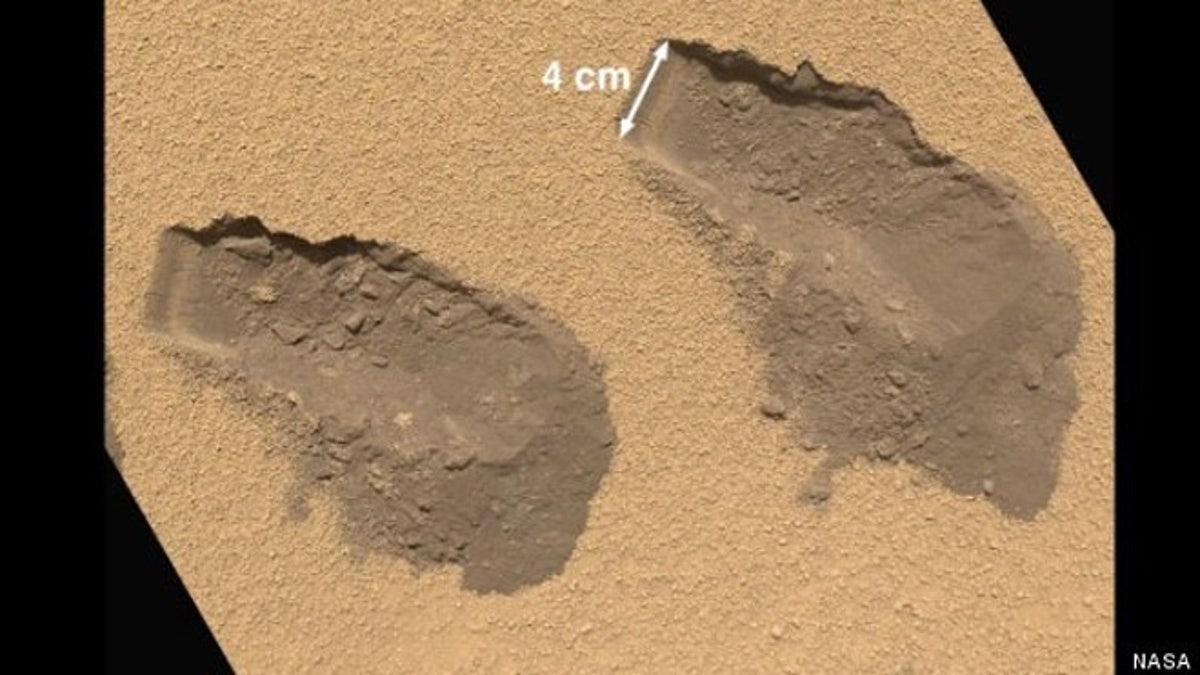
NASA's Curiosity rover has detected organic compounds on Mars but the findings remain inconclusive. (NASA)
They made a mountain out of a molehill.
Curiosity did make a big discovery on Mars, one that had the world speculating about the potential discovery of "organics" on the Red Planet. There's something there all right -- but it's little more than a pile of scientifically relevant sand, experts from the space agency said Monday.
During initial tests, the Curiosity team found hints of complex chemicals and simple organic molecules: evidence of chlorine, sulfur and water in Mars dirt studied by its onboard laboratory, as well as organic compounds containing carbon, the building block of life. But the space agency must now verify that these organics didn’t come from Earth or elsewhere in the cosmos.
NASA urged caution before jumping to conclusions about these complex chemicals.
John Grotzinger, who sparked a wave of rumors two weeks ago when he said that Curiosity had a finding that was “one for the history books,” noted that “patience” is Curiosity’s middle name.
- Magazine editors helped John McAfee flee Belize
- Police say tech mogul John McAfee still on the lam, despite blog’s claim of capture
- Hppy bthdy txt msng! The text turns twenty today
- Holy hashtag! Pope joins the tweeting masses, answering questions on faith
- ‘Curiosity’ returns photos from surface of Mars
- Mars revealed: A stunning look at the red planet
- Mars Rover Curiosity: The Red Planet’s Next Explorer
- NASA spacecraft confirms ice at shadowy north pole of Mercury, closest planet to sun
- Too soon to declare ‘life’ on Mars, NASA says
"You have to be careful about what you say and even more careful about how you say it," he said. "I was misunderstood."
“Organics are clearly there,” said Paul Mahaffy Principal Investigator for Curiosity’s Sample Analysis at Mars (SAM). Determining whether or not the organics found are biological in nature is “well down the road,” Grotzinger said during the conference Monday adding that there won’t be a "hallelujah moment” and that the hype surrounding the announcement came down to a “misunderstanding.”
The speculation began on Nov. 20, when Curiosity chief scientist John Grotzinger of Caltech in Pasadena told NPR “this data is gonna be one for the history books.” Grotzinger works on a team studying data from the rover’s Sample Analysis at Mars (SAM) instrument, an onboard chemistry lab able to identify organic compounds -- carbon-based molecules that are essentially the building blocks of life.
Grotzinger’s enthusiasm led to wildly overblown speculation that such compounds -- as well as biological compounds, little green men, and even Jimmy Hoffa -- had been found.
"We have a globally representative material that we have analyzed with all the instruments," Grotzinger said. "These comprehensive investigations are going to be the basis on which we make major discoveries. But we're going to have to be patient."
"We're doing science at the speed of science in a world that goes at the speed of Instagrams."




















